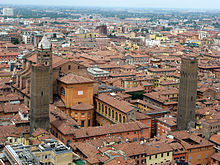Bologna Cathedral
| Metropolitan Cathedral of Saint Peter Cattedrale Metropolitana di San Pietro |
|
|---|---|

Bologna Cathedral from the Torre degli Asinelli
|
|
| Basic information | |
| Location | Bologna, Italy |
| Geographic coordinates | 44°29′45″N 11°20′36″E / 44.49583°N 11.34333°ECoordinates: 44°29′45″N 11°20′36″E / 44.49583°N 11.34333°E |
| Affiliation | Roman Catholic Church |
| Province | Archdiocese of Bologna |
| Country | Italy |
| Year consecrated | 1184 |
| Ecclesiastical or organizational status | Cathedral |
| Status | Active |
| Architectural description | |
| Architectural type | Church |
| Architectural style | Baroque |
| Groundbreaking | 910 |
| Completed | 18th century |
Bologna Cathedral (Italian: Cattedrale Metropolitana di San Pietro, Cattedrale di Bologna), dedicated to Saint Peter, is the cathedral of Bologna in Italy, and the seat and the metropolitan cathedral of the Archbishop of Bologna. Most of the present building dates from the 17th century, with a few parts from the late 16th century.
There was already a cathedral on the site (on the present Via Indipendenza) in 1028, accompanied by a pre-Romanesque campanile with a circular base (in the architectural tradition of Ravenna). This church was destroyed by a devastating fire in 1141. It was reconstructed, and consecrated by Pope Lucius III in 1184.
In 1396 a high portico (protiro) was added to the west front, which was rebuilt in 1467. From about 1477 the Ferrarese painters Francesco del Cossa and Ercole de' Roberti worked in the Garganelli Chapel on the creation of a cycle of frescoes which later had a significant influence on Niccolò dell'Arca and Michelangelo. The frescoes were lost in subsequent reconstruction except for a very few fragments.
In 1582 Pope Gregory XIII elevated the Bishop of Bologna to Archbishop, and accordingly the cathedral was elevated to the rank of "metropolitan church" (a bishop's seat with jurisdiction over other bishops and dioceses in its territory).
By order of Cardinal Gabriele Paleotti a radical remodelling of the interior of the building began in 1575, of which the crypt and the Greater Chapel (Capella Maggiore) survive. The alterations were so extensive however as to cause the vaults to collapse in 1599, and the decision was then made to rebuild the main part of the cathedral from scratch. Work on the new building started in 1605. A new façade was added between 1743 and 1747, to designs by the architect Alfonso Torreggiani, on the instructions of Pope Benedict XIV.
...
Wikipedia
